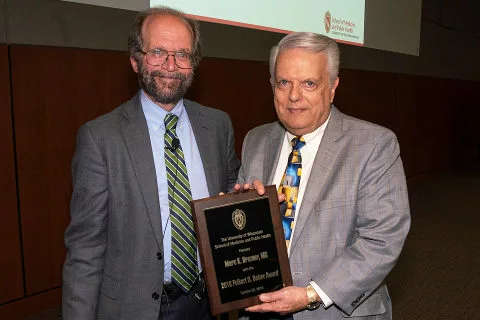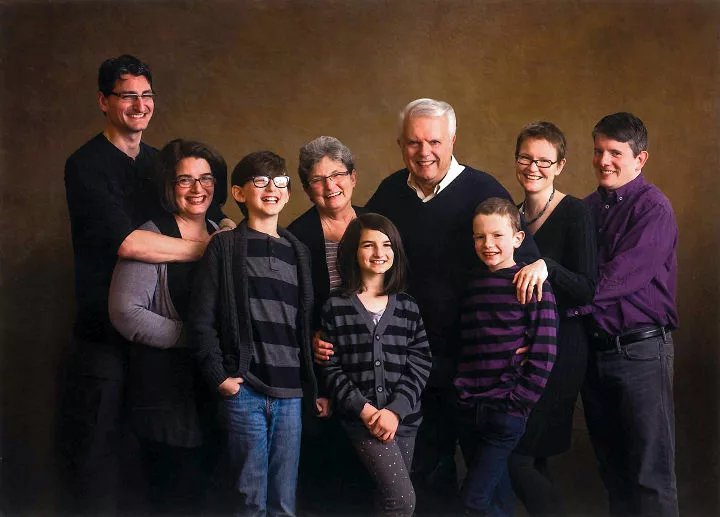20 Years of Stem Cells
University of Wisconsin researchers continue work towards new clinical applications, two decades after stem cell research began on campus.
When presenting the 2018 Folkert Belzer Lifetime Achievement Award to Marc Drezner, MD, University of Wisconsin School of Medicine and Public Health (SMPH) Dean Robert N. Golden, MD, noted, “Our school is largely defined and shaped by its people. The best thing about being dean is that I am surrounded by this community of incredibly bright, passionate and dedicated individuals who embrace the very best traditions of academic medicine and the Wisconsin Idea.”
Indeed, Drezner’s passion for the Wisconsin Idea — specifically his aim to help turn discoveries into health improvements for people throughout the state and beyond — and his dedication to furthering the school’s goals were central to the SMPH leaders’ decision to bestow upon him this prestigious award at the fall faculty and staff meeting in October 2018.

The award, created 22 years ago, “recognizes an outstanding individual who has had a pivotal impact on the school, and on the people and populations we serve,” said Golden.
He continued, “The intent of the award — named in honor of Dr. Folkert Belzer, the former chair of the Department of Surgery whose discoveries dramatically enhanced the field of organ transplantation — includes recognition of the ‘unsung hero’ whose contributions have extended over a period of time.”
During his research, teaching and patient care career — which began with 25 years on the faculty at Duke University followed by 18 years at UW–Madison — Drezner has been recognized as an expert in bone and mineral metabolism and has contributed to the knowledge of genetic diseases such as X-linked hypophosphatemic rickets and osteomalacia. He also has brought attention to postmenopausal osteoporosis through his work to characterize the psychosocial impact of this disease. Further, his research led to clinical studies that resulted in the discovery of a new disease, pseudohypoparathyroidism type 2, in 1973.
Drezner earned his medical degree at the University of Pittsburgh and completed an internal medicine residency and endocrinology fellowship at Duke University, where he held several faculty positions, ultimately as a professor of medicine and director of the Endocrinology Training Program and of the Center for Nutritional Studies.
He joined the SMPH faculty in 2000 as professor and chief of the Division of Endocrinology, Diabetes and Metabolism in the Department of Medicine. In 2005, Drezner became the director of the General Clinical Research Center. Capping off his productive career at UW–Madison, he retired in July 2018 from his most recent roles: senior associate dean for clinical and translational research in the SMPH and executive director of the Institute for Clinical and Translational Research (ICTR), which is a collaboration among the SMPH, the schools/colleges of Nursing, Veterinary Medicine, Pharmacy and Engineering, and the Marshfield Clinic Research Institute.
Looking back, Golden said, “In 2006, when I joined the SMPH as dean, it was clear to me that we really needed to accelerate the translation of the school’s incredible research discoveries to the ‘bedside’ — to directly impact patient care. At that time, the National Institutes of Health (NIH) had recently established its Clinical and Translational Science Awards (CTSA) Program, which presented a great opportunity. I recognized that Marc was a highly productive physician-scientist who had successfully moved his laboratory discoveries into clinical applications — and that he had personally achieved the goals of the CTSA Program. I thought he would be the perfect person to steer our CTSA ship.”
With that program in mind, in 2006, the SMPH created ICTR — initially funded by a substantial grant from the Wisconsin Partnership Program and generous support from the UW Medical Foundation — and Golden asked Drezner to create and lead a team to apply for the first CTSA grant in 2007. He has since led teams that implemented the first award and successfully applied for competitive renewal grants in 2012 and 2018.

ICTR’s many goals include training young investigators to conduct clinical and translational research, and establishing community-academic partnerships to help inform research design and initiate conversations about translation and dissemination of discoveries into diverse settings.
Drezner noted that ICTR’s community-engaged research programming — with activities in 58 of Wisconsin’s 72 counties — is the nation’s largest among CTSA grant-holding centers and includes a strong emphasis on collaboration and team science. (A feature article in Quarterly magazine, Volume 20, Number 3, 2018, includes much more about ICTR; see med.wisc.edu/ictr-advances).
Upon accepting the Belzer Award, Drezner shared his gratitude for the opportunities he’s had at the SMPH. He pointed to the “family feeling” about the way people work toward common goals.
“I have had multiple ‘families’ here, starting with endocrinology. The Diabetes Management Service we established was my first real venture into making the health of patients in Wisconsin better because our work entailed communicating closely with referring physicians about new technologies to manage diabetes in their patients,” explained Drezner.
“The past 12 years with the CTSA have been the most remarkable. It was truly a family effort, and I am indebted to each ‘family’ member,” he says. “Our work was not easy, but it was pleasurable to see the incredible work we could accomplish together, always in the right spirit.”
Drezner recalled, “At my retirement party, I was deeply touched by how many people thanked me for helping impact their careers. But, in turn, I feel indebted to them for their accomplishments.”
His personal successes have been many, as reflected in numerous academic awards; election into the American Society of Clinical Investigation, the American Association of Physicians and the Association of Osteobiology; service on NIH study sections; inclusion in ranking of the Best Doctors in America from 2002 to 2017; and placement on the University of Pittsburgh Endocrinology Wall of Fame. He is widely published, and he has served on editorial boards for professional publications and as treasurer and president of the American Society of Bone and Mineral Research, as well as editor of the Journal of Bone and Mineral Research. Moreover, he is proud to have trained 16 physician-scientists and doctoral students, many of whom hold high-ranking positions in academic medicine.
About his retirement, Drezner said he misses the people at UW–Madison but does not miss facing intense deadlines. He and his wife of 51 years, Sherree Drezner, moved back to the region of North Carolina that they called home for several decades before they became Wisconsinites. There, they have reunited with lifelong friends and seized upon the opportunity to spend more time with their children and grandchildren. This has enabled them to share in the excitement as their grandchildren continue to grow into adolescence and beyond.
Reflecting upon a longstanding rivalry he had with Golden—based on their past careers at Duke and the University of North Carolina, respectively—Drezner quipped that they do not talk about basketball, but he will always treasure his friendship and working relationship with Golden.
“Everybody in academic medicine runs into brick walls, but at the UW School of Medicine and Public Health, especially under Dean Golden’s guidance, the overarching attitude is, ‘Let’s figure out a way to get around that wall,’” Drezner noted. “And this positions the school’s faculty and staff to make extraordinary advances.”